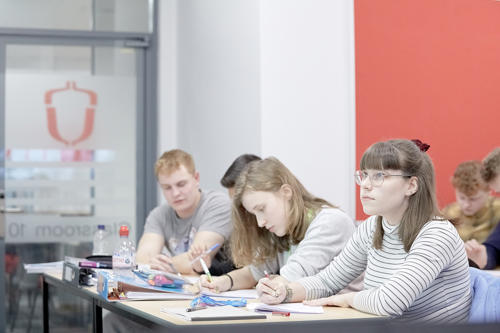Course Overview
If you're interested in people and the world around you, then Sociology is a subject that will appeal to you.
Sociology is the study of societies and looks at how people live, behave and work together in groups. Some examples of the many issues that will be addressed in this course are:
- What is the purpose of education?
- Why are poorer people typically less healthy?
- How much are we influenced by the media?
- What is the best way to control crime?
You will also develop your knowledge and understanding of sociological theory and the research methods used by sociologists to examine specific aspects of society.
In studying Sociology, you will question often 'taken for granted' facts and develop your ability to examine and evaluate conflicting arguments about some of the issues and problems society faces. Sociology is also an active, diverse subject that is accepted by all universities and is useful for complementing a number of other A-level subjects including History, Psychology, Business and English.
To do well in this subject, you need to take an active interest in the world today by keeping up to date with media reports and world news. You must be prepared to understand and memorise a wide range of terminology, concepts and theories.
You will also be required to write sustained, structured essays to demonstrate confident knowledge and persuasive perspective.
Perhaps most importantly, you must bring an enthusiasm for discussion and debate to contribute valuable knowledge and ideas to a wide range of interesting topics!
At Hartpury, we follow the AQA Sociology specification.
On this course you'll study the following topics over two years.
- Theories in Sociology
- Education
- Families and Households
- Research methods
- Methods in Context
- Crime and Deviance
- Media in Sociology
The majority of A-level lessons are delivered from the classrooms in our College Learning Centre, providing a modern learning environment, contemporary classrooms with smart boards, well-equipped library and learning resources.
Lessons are delivered in a traditional manner and include individual tasks as well as group work. A-level students will be set regular homework tasks as well as regular assessments throughout the academic year.
A-levels offers a unique timetable facilitating sporting development and extra-curricular activities, and a full enrichment programme to enhance employability skills and the holistic development of all students.
A-level students have access to our equine and sport facilities, animal collection, and our commercial Home Farm.
Students have a pastoral tutor who will support them to succeed in their studies and their enrichment activities. All students have access to our academic and wellbeing support teams who run regular workshops and one-to-one sessions on campus and online. In addition, all students have access to medical professionals on campus.
Exam board: AQA
Total of six hours assessment split over three examination papers. Each paper will have a duration of two hours.
To help prepare you for your exams throughout the course, you’ll complete regular end-of-topic assessments, homework tasks and mock exams. These will help track your progress and highlight areas to improve.
An A-level in Sociology can be combined with subjects like History, English, Psychology, Business Studies or Economics and can lead to a wide range of exciting progression routes. Students may go on to careers in education, public services, communications, research or social policy.
Popular combinations include Sociology with History for roles in archaeology, research or museum and gallery work; with English for careers in journalism, PR, copywriting, marketing or international teaching; or with Psychology for progression into clinical psychology, psychiatry, youth support or social research. Combining Sociology with Business or Economics opens up opportunities in corporate communications, marketing strategy or business consultancy.
These combinations support national skills priorities in education and research, public administration, creative industries, and professional services. Locally, they align with Gloucestershire’s skills needs in health and social care.
Course Overview
Course information
If you're interested in people and the world around you, then Sociology is a subject that will appeal to you.
Sociology is the study of societies and looks at how people live, behave and work together in groups. Some examples of the many issues that will be addressed in this course are:
- What is the purpose of education?
- Why are poorer people typically less healthy?
- How much are we influenced by the media?
- What is the best way to control crime?
You will also develop your knowledge and understanding of sociological theory and the research methods used by sociologists to examine specific aspects of society.
In studying Sociology, you will question often 'taken for granted' facts and develop your ability to examine and evaluate conflicting arguments about some of the issues and problems society faces. Sociology is also an active, diverse subject that is accepted by all universities and is useful for complementing a number of other A-level subjects including History, Psychology, Business and English.
To do well in this subject, you need to take an active interest in the world today by keeping up to date with media reports and world news. You must be prepared to understand and memorise a wide range of terminology, concepts and theories.
You will also be required to write sustained, structured essays to demonstrate confident knowledge and persuasive perspective.
Perhaps most importantly, you must bring an enthusiasm for discussion and debate to contribute valuable knowledge and ideas to a wide range of interesting topics!
At Hartpury, we follow the AQA Sociology specification.
What you’ll learn
On this course you'll study the following topics over two years.
- Theories in Sociology
- Education
- Families and Households
- Research methods
- Methods in Context
- Crime and Deviance
- Media in Sociology
How you’ll learn
The majority of A-level lessons are delivered from the classrooms in our College Learning Centre, providing a modern learning environment, contemporary classrooms with smart boards, well-equipped library and learning resources.
Lessons are delivered in a traditional manner and include individual tasks as well as group work. A-level students will be set regular homework tasks as well as regular assessments throughout the academic year.
A-levels offers a unique timetable facilitating sporting development and extra-curricular activities, and a full enrichment programme to enhance employability skills and the holistic development of all students.
A-level students have access to our equine and sport facilities, animal collection, and our commercial Home Farm.
Students have a pastoral tutor who will support them to succeed in their studies and their enrichment activities. All students have access to our academic and wellbeing support teams who run regular workshops and one-to-one sessions on campus and online. In addition, all students have access to medical professionals on campus.
How you’ll be assessed
Exam board: AQA
Total of six hours assessment split over three examination papers. Each paper will have a duration of two hours.
To help prepare you for your exams throughout the course, you’ll complete regular end-of-topic assessments, homework tasks and mock exams. These will help track your progress and highlight areas to improve.
What can you do after this course?
An A-level in Sociology can be combined with subjects like History, English, Psychology, Business Studies or Economics and can lead to a wide range of exciting progression routes. Students may go on to careers in education, public services, communications, research or social policy.
Popular combinations include Sociology with History for roles in archaeology, research or museum and gallery work; with English for careers in journalism, PR, copywriting, marketing or international teaching; or with Psychology for progression into clinical psychology, psychiatry, youth support or social research. Combining Sociology with Business or Economics opens up opportunities in corporate communications, marketing strategy or business consultancy.
These combinations support national skills priorities in education and research, public administration, creative industries, and professional services. Locally, they align with Gloucestershire’s skills needs in health and social care.
To study A-level Sociology, you’ll need a minimum of five GCSEs at grade 4 or above. This must include English Language at grade 6 or higher.
As part of your application, you’ll need to include a short personal statement. We recommend reading our Personal Statement Guidance to help you include all the right information. You can add your statement when you apply via our Online Application Form.
If we need any additional details to support your application, you may be invited to take part in a short telephone interview with a member of the relevant course team.
You should expect some small costs for books and stationery. There will also be opportunities to take part in trips related to the topics you are studying. In the past, these have included visits to Alton Towers, the Houses of Parliament, JCB, Uttoxeter, and the Cadbury Factory. These trips incur a charge/are covered by the educational visits fee.
Students are required to pay a non-refundable educational visits fee at enrolment.
Which other A-levels does this work well with?
A-level Sociology typically goes well with: Business, English Language and Literature, Geography, History, and Psychology.
Can I study A-level Sociology and play in the Sports Academy?
This will depend which other A-levels you are studying. Where possible we try to work academy timetables around academic timetables, however this is not always possible. Please email to discuss your individual circumstances.
Can I bring my horse and study A-levels?
Yes - we provide students with the opportunity to bring their horse (or horses) with them while they study. On-site livery is offered to students on a DIY or full livery basis. This is subject to availability as demand is always high. Fees apply.
How much does the course cost?
If you're a UK student under the age of 19 enrolling in full-time A-level courses at Hartpury College, you typically won't need to pay tuition fees. For further information, details for those over 19 year-of-age and international students, visit: Finance | Hartpury College

Outstanding
Rated 'Ofsted Outstanding in all areas' for academic and curriculum-related provision

99.4% pass-rate
With an A-level pass rate of 99.4% (Hartpury College 2025), our outcomes for students are exceptional.

Living in on-site college accommodation at Hartpury, you’ll be part of a vibrant and international community of students of all ages who share their experience of life at college and university together on one campus.

The Hartpury Certificate is an enrichment programme designed to support our students to grow.


A-levels or a diploma?
Are you unsure about whether A-levels or a BTEC Diploma are the right choice for you? Find out the key differences and which qualification would best suit your learning style and your career and further study ambitions on our dedicated page.









